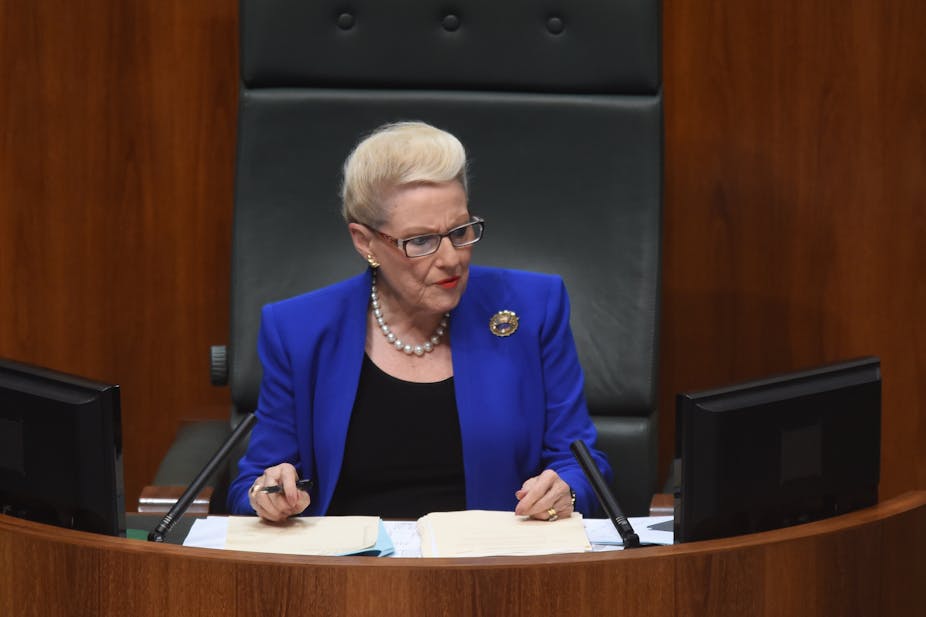Bronwyn Bishop has finally quit the speakership after weeks of revelations about her extravagant claims and the government has set up a sweeping review into the parliamentary entitlement system to quell public anger and get more clarity into the system.
Prime Minister Tony Abbott, who announced that she had resigned in a letter to the Governor-General, Sir Peter Cosgrove, said that a disconnect had been exposed between the rules about entitlements and public expectations.
Bishop said in a statement that it was “because of my love and respect for the institution of parliament and the Australian people that I have resigned as speaker”.
Bishop at last bowed to the inevitable well after it was clear that she had lost the support of senior ministers and many other Liberals. By the weekend Abbott himself realised she could not stay.
Although Abbott earlier stood by Bishop, it became obvious the situation was untenable, given the community outrage, new examples of Bishop’s extravagance emerging daily, parliament resuming in a week and the opposition threatening disruptive tactics.
Abbott told a news conference in Sydney that after a number of conversations with Bishop over the last few weeks, she had called him on Sunday to tell him that she would be resigning.
“Bronwyn Bishop has done the right thing by the parliament, by the government and by the people of Australia,” Abbott said.
Abbott tried to avoid being drawn on the details of Bishop’s spends, saying that “what has become apparent, particularly over the last few days, is that the problem is not any particular individual. The problem is the entitlements system more generally.
"There are still too many situations where members of parliament can do things which are inside entitlement but outside public expectations. So it’s very important that we have a system which is independent, which is accountable, which is transparent, and which is workable.”
The review would be a root and branch one, not a matter of tinkering. A committee will be chaired by a former head of the Finance Department, David Tune, and the head of the Remuneration Tribunal, John Conde. Abbott said the inquiry would not be rushed – it will report in the first half of next year.
The Finance Department’s scrutiny of Bishop’s claims over the past decade continues. It is not clear whether its report will be released publicly.
As pressure intensified on Bishop in the last few days, it was reported at the weekend that she had spent more than A$260,000 on cars in recent years including $1000 to attend the opening of Yes, Minister, to which she and her staff had free tickets. Liberal sources said there was more as yet unrevealed about her expenses.
Possible replacements as speaker include South Australian backbencher Andrew Southcott; former chief whip Philip Ruddock; Deputy Speaker Bruce Scott; and Defence Minister Kevin Andrews.
Opposition Leader Bill Shorten said Bishop’s resignation, like her apology, “was overdue and unrepentant”.
“Unfortunately the Prime Minister still won’t accept that Mrs Bishop has done anything wrong. Mr Abbott has blamed the system, but it was Mrs Bishop’s addiction to privilege that was the real culprit.”
Independent MP Andrew Wilkie, who with Clive Palmer had foreshadowed a motion of no confidence in Bishop if she remained speaker when parliament resumed, greeted her resignation with: “Thank God for that.”
But Wilkie said Bishop’s resignation “must not be the end of the action taken against her in particular”. He said Bishop’s misuse of entitlements was of “remarkable proportions and must be investigated by the Australian Federal Police to find out if criminal fraud has occurred”.
“The Prime Minister is wrong to suggest that this comes down to the gap between current entitlements and community expectations. The fact is that the current entitlements rules do not allow a member or a senator to go somewhere principally for private reasons and then to certify it as an official trip. To do so is fraud,” Wilkie said.
Abbott said that the entitlement rules lacked clarity and transparency. “We need a system that more independently sets and monitors parliamentary entitlements, working with the Department of Finance and the independent Remuneration Tribunal.
"We need a system that enables parliamentarians, their staff and the public to operate inside the rules with confidence and for those rules to meet the expectations of the community.”
Abbott pointed out that MPs had political duties as well as their other duties and the system needed to acknowledge that.
The terms of reference ask the review committee to propose options for the creation of “an independent parliamentary oversight system”.
It is to look at reducing ambiguity about what is official business, improving transparency, acknowledging the role of party business in parliamentary business, and proposing how to deal more effectively with alleged misuse. It will consider international best practice and call for submissions.

